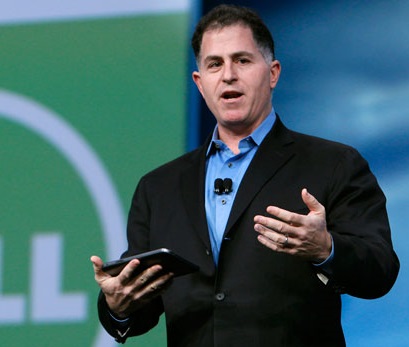Michael Dell: We’re In A ‘Change Or Die’ Industry

Dell founder and CEO talks about tablets and ARM-based microservers, almost a year after the company went private
Tablets and ARM-based servers were high on the agenda during Michael Dell’s keynote at the company’s annual Solutions Summit in Brussels.
The event was held almost a year after Dell went private, ending its 25 year run on the stock exchange. As a result, it shifted the spotlight on changes within Dell, and its plans for the future. Michael Dell said privatisation enabled the company to increase the focus on customers.
“We’ve invested more in R&D, we’ve invested more in gaining more customer relationships, in the channel and in innovation. We look at the range of products that we’re delivering now, the growth we’re delivering, and we’re re quite excited.”
Thus spoke Dell
The Solutions Summit in Brussels is traditionally focused on the EMEA region. Europe is historically important for Dell – the company was founded in 1984 and came to the UK as its first foreign market just three years later, in 1987. However, this year’s event had a different format, and left the impression that Dell was trying to reassure its customers and show it had a plan, not just for Europe, but in general.
 Michael Dell started his keynote by reaffirming the company’s position as a cloud hardware provider, two weeks after the release of the 13th generation of Dell PowerEdge servers. “Cloud-based infrastructure is the roads and bridges of the 21st century,” he said.
Michael Dell started his keynote by reaffirming the company’s position as a cloud hardware provider, two weeks after the release of the 13th generation of Dell PowerEdge servers. “Cloud-based infrastructure is the roads and bridges of the 21st century,” he said.
“Data is the most valuable resource, and we’re big believers in the idea of the data economy. As there is an enormous increase in the number of devices and machines that’s creating more data, [there’s] a real opportunity to turn that data into insights and better outcomes for students, patients, retailers, manufacturers.”
Continuing where he left off at this year’s IDF, the CEO reported that Dell’s PC division was healthy, as long as the term ‘PC’ included tablets, convertibles, thin clients and all-in-ones. He said Dell had been growing its PC market share for six quarters straight, and this process could accelerate with the release of new devices, such as the Venue 8 7000 tablet with RealSense IR camera.
“Some companies have been getting out of the PC business, saying that PC business was dead. We absolutely believe in the PC business. It’s certainly changing, it has new forms – the virtual PC, the tablet – but we’re in this, consolidating, gaining share and growing.”
Michael Dell also discussed the opportunity in Internet of Things – saying that the company has been helping its customers store and manage their data for more than two decades, and it would be only natural if it would offer a platform for analysing IoT data. The foundation for such a platform is most likely to emerge out of acquisitions, like the company’s recent purchases of Quest Software and StatSoft.
In conclusion, Dell talked about microservers – high density systems which contain a very large number of relatively underpowered processors, as opposed to the big, hot and power-hungry chips traditionally used in the data centre.
He said that ARM was becoming “more interesting” as it moved to 64-bit, and that despite Dell’s long-time relationship with Intel, the company was open to experimentation with a competing architecture, both in end-user devices and servers.
“At the end of the day, if ARM works really well and it costs less, we’re happy to use ARM. Intel is our partner because what they are delivering is very valuable, it’s what customers want. Today, it’s absolutely the best. What’s going to be best in five or ten years, we’ll have to see.”
Do you know the history of Dell? Take our quiz!